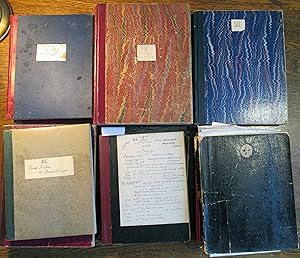Descripción
Eighteen diaries, handily numbered 1 18, with entries covering approximately 2822 pages and totalling roughly 423,300 (for the most part readily legible) words. Condition and size vary, but the majority of the diaries are in good order, with robust stitching and the outer covers firmly attached. Giving the extended, seldom seen perspective of a group of recently retired individuals on a momentous period in British history, insight into their experience of aging, illness and death, and the manner in which they cope with these universal trials during the six years of WW2, when they are under great pressure to reengage more actively with wider society to help the war effort. Taking in such matters as class prejudice, rapidly shifting social boundaries, changing gender roles and the impact of technology on domestic life. They also show the development of a versatile & committed diarist, gradually finding his voice and bending the medium to suit the shifting needs of the moment. Henry Maurice Surtees Tuckwell (b. 1872 d. 16th October 1951), worked as an engineer, with an impressive C.V., including the Royal Navy and the Daimler Motor Company Ltd., before retiring in 1936. The diaries cover the complete period of his retirement to Little Woodlands, Combe Lane, Wormley, Surrey at the age of 66. Where he lived with his sister, Gertrude Mary Tuckwell (b. 1861 D. 1951), the notable trade unionist and author, who became the first woman magistrate of London in 1919, to whom he is devoted, and mentions on most days. The final diary gives great detail of her last days and death on August 5th 1951, and continues to 9th October 1951, a week before Henry's own death. The earlier diary is that of their mother, Rosa Surtees Tuckwell, who was married to William 'radical parson' Tuckwell. Rosa's sister was Emilia Francis Strong, AKA Lady Dilke, author, historian, feminist and trade unionist, who had a profound influence upon her niece, Gertrude. Rosa's diary is approximately 150 pages, bound in black Rexine, the front cover nearly detached, with a small paper label attached. It is quite densely filled cover to cover, though with a few blanks and some excised sections of pages. Primarily day-to-day matters, much concern for her son, Maurice [H. M. S. Tuckwell] who has recently married Hilda (Annie Hilda Tuckwell (née Leonard)) and had a baby, there are several urgent telegrams from him regarding the baby's health, including (clearly superfluous) written instructions on how to look after the baby tipped-in. Her daughter, Marion also features regularly, with several letters loosely inserted, including one from Weymouth with a sketch of the front. There are a few botanical cuttings, which are labelled, and newspaper cuttings regarding Rev. William Tuckwell's sermons and teachings. Some pages are devoted to discussions of English literature and literary matters. There is also family and parish gossip, notes on the weather and remarks regarding her own and her family's health. Of particular interest is a trip to the Lake District, which includes a detailed description of men's wrestling at the Grasmere Sports. Henry's wife, Annie Hilda Tuckwell (née Leonard b. 1875), died on 20th October 1937 and this presumably prompted the dramatic change of lifestyle. The way that the diaries develop, becoming more lucid and personal in content after the first two, suggest either that he was not a regular diarist before this period or that previously they had been confined in purpose to practical matters such as organising his professional life. Although he still has his sister Gertrude to converse and share jokes with, the entries become in part the written repository of the day-to-day confidences, hopes and worries he would previously have shared with his wife. Their only son, also named Henry Tuckwell, died in 1924 at the age of 26, he was survived by his wife, Edith Fanny Tuckwell (née Chancellor), who died in 1937 at the age of 57, leaving Richard "Dick" Mauri. N° de ref. del artículo 5700
Contactar al vendedor
Denunciar este artículo
![]()




